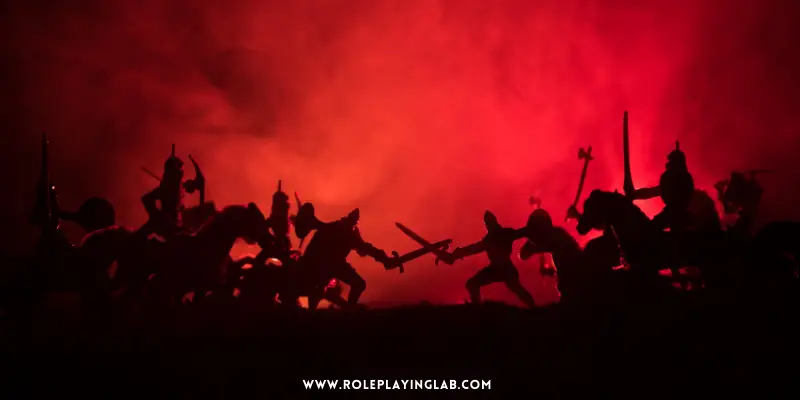In Dungeons and Dragons (DND), your characters live and die in rounds.
How long is a round in DND?
A round in DND is 6 seconds of game time. A round in real-time is between 10 minutes and 30 minutes. The average time of a round in real-time is 15 minutes. The actions, reactions, and in-game decisions do not have official times in DND. There are 10 rounds in a minute of game time.
In this article, we’ll answer everything you need to know about, “How long is a round in DND?”
How Long Is a Round in DND? (Game Time)

A round in DND is 6 seconds.
During a D&D adventure, game time refers to the amount of time elapsed in the imaginary adventure.
In game-time, events happen fast.
A dwarf swings an ax, a dire weasel scurries into the darkness, a dragon breathes fire.
There is a massive difference between in-game time and actual, real-world time. In the real world, Dungeon Masters (DMs) and players must choose what to do, refer to rules, and roll dice.
In the game, time doesn’t stop.
However, in the real world, game-time “freezes” while the players and the DM take action.
Here is a chart with quick answers to questions about the timing of rounds in D&D:
| Timing Questions in D&D | Average Timing in D&D |
|---|---|
| How Long is a Round in Game-time? | 6 seconds |
| How Long is a Round in Real-Time? | 10 – 30 minutes |
| How Long is a Turn in Game-time? | 1 minute (10 rounds) |
| How Long is a Turn in Real-Time? | 1 hour |
How Long Is a Round in DND? (Actual Times)
Although a round in DND covers a mere 6 seconds of game time, the amount of time that elapses in real-world time varies.
A round in real-time can least between 10-30 minutes or longer.
The length of a round in real-time depends on:
- The preparation of the Dungeon Master (DM)
- The preparation of the player
- The complexity of the in-game encounter
- How fast the player makes decisions
- How fast the player character makes decisions
- Any external distractions to the DND game (i.e. bathroom breaks, food delivery, power outage, etc.)
To test how long rounds last in real-time, I used a stopwatch at my last few D&D games.
I timed how long each player took on their turn.
During a single round in DND, each player and non-player character gets a turn.
The results are in the chart below:
| Players | Average Time of 1 Round |
|---|---|
| Player 1 | 1:30 seconds |
| Player 2 | 3:45 seconds |
| Player 3 | 2:15 seconds |
| Player 4 | 1:30 seconds |
| Player 5 | 3:04 seconds |
As you can see, the length of a round in real-time varies depending on the player.
The average time for a turn was 2 minutes and 24 seconds. And the longest time for a turn was 3 minutes and 45 seconds.
The time of an entire round came out to be 11 minutes and 24 seconds.
It’s important to note that I scrapped the times of one game because of constant interruptions.
For example, a pizza delivery guy showed up, one player’s significant other called with an emergency, and we spent at least ten minutes hunting for our favorite bottle opener.
Things happen.
It’s best to be prepared, expect time delays, and have a Plan B.
How Long Is a Round in DND 5e?
A round in the fifth edition of Dungeons and Dragons is 6 seconds of game time.
During a round, each player character and enemy gets a turn.
A player’s turn can consist of:
- One action
- One bonus action
- One reaction
The order of turns is decided by the DM and is based on the initiative roll. The creature or player with the highest initiative roll goes first, followed by the creature or player with the second-highest initiative roll, and so on.
How Long Is a Round in DND 6e?
In the sixth edition of DND, a round still represents approximately 6 seconds of time in the DND game.
The timing of rounds, turns, and combat sequences did not change.
Most of the sixth edition changes do not impact the most basic rules of gameplay.
How Long Is a Combat Round in DND?
A combat round in DND covers 6 seconds within the game and an unspecified time in the real world.
Combat is one of the more complex types of encounters in D&D.
Therefore, combat can move swiftly or rather slowly. That’s because there is a lot for the Dungeon Master and players to consider and calculate.
For example, for each round, the DND group much consider:
- Who surprised who in the combat encounter? (If anyone)
- Where is everyone positioned in the encounter?
- Who makes the first move or action during combat? (initiative rolls)
- What action each character and enemy takes.
- Attack rolls for melee and ranged attacks.
- The saving throws for the selected action.
- The damage from a hit or critical hit.
- Any repercussions based on the damage.
- The effects of spells.
- The effects of the landscape or environment.
- Any bonus actions.
- Any reactions.
- Special feats, abilities, and skills.
- The shifting of positions during combat.
- Any applicable official DND rules or homebrew rules.
As you can see, each round of combat can last a long time.
The more complex the combat encounter, the more time it will likely take. Your battle round timing might be longer or shorter than mine.
In my experience, most of my combat rounds take 10-30 minutes or longer.
Each combat encounter can easily take half an hour.
The bigger battles with multiple enemies can run over an hour sometimes.
Here are some good rules of thumb:
- A bigger battle will take longer than a shorter battle
- A tougher enemy will take longer than a weaker enemy
- Lower level characters will take longer than higher-level characters
- Spellcasters will often take longer than non-spellcasters
- Talkative players will take longer than non-talkative players
To help you calculate timing, here is a good video that goes over the combat basics of DND:
How Long Is a Non-Combat Round in DND?
Non-combat rounds usually take less real-time than combat rounds.
In game-play, the time elapsed is still 6 seconds per round.
Non-combat rounds include social encounters, exploring a cave system, solving a puzzle, interrogating a suspect, or testing out a magical item.
When timing non-combat encounters, my rounds went a few minutes faster than combat encounters.
Most non-combat rounds lasted closer to 1-2 minutes per player.
But this wasn’t always the case.
If there was a particularly difficult puzzle or riddle, the rounds extended out to as long or longer than some combat rounds.
How Long Is a Slow-Motion Round in DND?
A slow-motion round in DND still lasts 6 seconds of game-time.
What is a slow-motion round?
A wizard or sorcerer can cast a Slow spell that affects up to 6 beings within a sphere of 40-cubic feet.
If impacted, a creature or player has fewer options during their turn.
For example, a player’s speed is reduced by half. They face a -2 penalty to their Dexterity-related saving throws.
They also get a -2 disadvantage to their armor class (AC).
To make matters worse, the affected player can only take a single action or bonus action (not both) during their turn.
All other special abilities, feats, and enhancements to movements get squashed by the Slow spell.
For all un-impacted players and creatures, time moves at its regular speed.
How Long Is a Round When You Level Up in DND?
A round is 6 seconds of game time no matter your level in DND.
When your character levels up, their Hit Points increase.
At certain levels, you also get to choose an ability score to increase—usually by +2 points. Your damage also goes up.
Otherwise, the game-play mechanics and timing of rounds, turns, and combat sequences do not normally change.
Is a Round or a Turn 6 Seconds in DND?
A round is 6 seconds of gameplay.
The term, “turn,” can mean a collection of 10 rounds (or one minute in game time). A turn is also sometimes used interchangeably with a round based on the initiative order of an encounter.
For example, “Hey, Andre, it’s your turn.”
Is a Round or an Action Longer in DND?
A round is longer than an action in DND.
During a single round, multiple players and creatures take multiple actions.
Just think of a battle where many things are happening all at once:
- A Cleric casts a cantrip
- An Elven archer shoots a crossbow
- A Hill Giant swings its club
- A beholder casts a spell with its central eye
- A Gelatinous Cube engulfs an adventurer
- Another player dodges the Hill Giant’s attack
You can see how each creature or player might take several actions during a single round.
Is a Round Ever Longer in DND?
In-game time doesn’t change.
However, there are many factors that can affect the timing of rounds inside and outside of the game.
These factors include:
- Slow spell
- Delayed action (hold movement/ready action)
- How well players know their spells
- How well players know their characters
- How well the Dungeon Master facilitates the game
How Do You Speed Up Rounds in DND?
After running D&D games for years, I’ve developed a few systems for speeding up combat rounds.
You can also apply these methods to other types of encounters.
Here is how to speed up a D&D round:
- Ask your players to prepare for their turn while other players decide what to do.
- If a player is not ready, skip them for that turn (but possibly come back to them).
- Ask players to speak clearly and concisely when taking their turns.
- Roll attack and damage dice at the same time.
- Ask players to write down and calculate modifiers to attacks, saving throws, damage dice, etc. so they don’t have to add everything up every time.
One mechanical way to speed up all rounds is to lower the AC of players and enemies. The fewer missed attacks the faster rounds (and combats) will go.
Final Thoughts: How Long Is a Round in DND?
Keep in mind that speed is not the ultimate goal of a DND adventure.
Each game should prioritize fun, entertainment, and social interaction. These things can and should take time.
Faster is not always better.
Don’t forget to slow down to smell the smoky aftermath of a fireball.
Related:
- Can You Move Through Enemies in D&D? (Solved for Beginners)
- D&D and Bonus Actions: 11 Things You Need To Know
- Can Spells Do Critical Damage in DND? (Solved)
